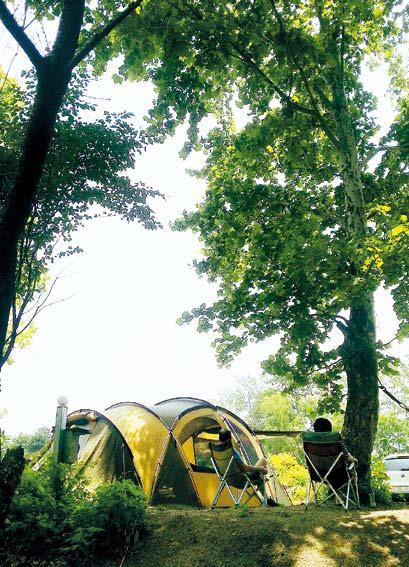 |
A family relaxes under a tent on Udo Island, Jeju. (Park Hae-mook/The Korea Herald) |
After spending most of his week sitting at his desk, investment adviser Kim Jong-do sets off with a backpack once or twice a week to explore some of the seldom visited parts of Korea.
“It doesn’t matter whether it’s a mountain or the seaside. I just pack light and leave,” said Kim, who recently starred in a survival program on cable channel TV Chosun.
“I enjoy my time with nature and when it gets dark, I find a spot to spend the night.”
His camping gear is basic: a rope, a small bush knife and a camping tarp to make shelter for the night and for emergency situations.
Kim, a Korean Bear Grylls, explains that what he does is the most “classical” type of camping. “It’s about using the minimum number of tools and enjoying nature to the fullest,” Kim said.
In the last three to four years, camping has grown in popularity as a leisure activity among Koreans. Campsites are booked months ahead from early summer to fall. More campsites are being created and sales of camping gadgets and gear have soared.
There are more than 600 campsites in the country, according to the maker of Camping Roadmap, an app that offers information on campsites in Korea.
Imports of tents increased 110 percent in May on-year, and have totaled 55 billion won ($47 million) so far this year.
“Family camping has been popular for years. You set up a large tent that comes with separate sleeping and living room spaces. Since you travel with your family, you need more gadgets and gear. It has become ‘heavy’ camping. It is still a popular type of camping to novice campers. But now people are enjoying camping in more diverse ways,” said Kim San-hwan, CEO of Dreammap, a publishing company specializing in books related to outdoor activities, in an email interview.
“The camping boom in Korea reflects the increase of the country’s gross national income, reaching almost $30,000 per capita. People seek better lifestyles and fun leisure activities as they earn more money. The other factor is that camping offers busy modern workers time to rest and recuperate in nature and time to communicate with their families and friends,” he said.
 |
A tent in the campground of the Pyeonghwa Riverside Arboretum in Yeoncheon, Gyeonggi Province (Park Hae-mook/The Korea Herald) |
Hard-core campers choose to avoid crowded campsites and visit less-explored areas of the country.
“The campsites seemed like a refugee camp to me. There are just too many people and they are noisy with kids running around,” said Kim Dong-yeon, an auto test engineer for GM Korea, and founder of the online community “Hungry Backpacker” (cafe.daum.net/hungrybackpacking).
He chooses less-traveled spots over the comforts of home some campsites provide ― tap water, public restrooms and even Wi-Fi.
“More people have started to avoid the convenience offered by modern camping gear and cars, and choose to walk or ride bicycles, motorcycles or kayaks,” Kim of Dreammap said.
Less gear means campers need to be more skilled at camping and hiking.
For Kim Dong-yeon, 36, it was a smooth transition from hiking to camping.
“I’ve enjoyed hiking since I was in my mid-20s. While hiking, I used to find a place to stay at a village and had to come all the way down to spend the night there. So I decided to start sleeping in the mountains,” Kim said.
Seong Q, a reporter at Men’s Health magazine, is another backpacker who camps in the woods. He carries a sleeping bag, a small chair and some food.
“People ask me what I do out in the woods after hiking. I cook small dishes and eat and listen to the water running downstream and watch stars in the sky. If I have music on, that’s good too. I talk to my camping friends or I don’t have to talk if I don’t want to,” said Seong.
He goes to sleep at 10 or 11 p.m. and wakes up around 6 a.m. “The clean air in the woods puts you to a sound sleep,” he said.
Camping in the wild sometimes can be dangerous. The “survival man” Kim Jong-do once broke his ribs after falling off a cliff. Not wanting to disturb anyone because he “caused the accident by not being careful enough,” he spent another day there to recover from his injury and gather energy to get out of the place.
“Surviving in the wild is the same as surviving everyday life at work. I get tremendous stress from stock fluctuations and investment results, and camping is one way I recover from the stress,” Kim said.
“After you overcome such a dangerous situation outside, it gives you confidence to overcome difficulties in life.”
By Lee Woo-young (
wylee@heraldcorp.com)









